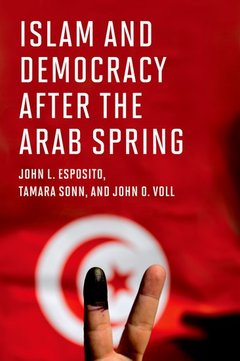Islam and Democracy after the Arab Spring
Langue : Anglais
Auteurs : Esposito John L., Sonn Tamara, Voll John O.

In late 2010, the wave of civil resistance known as the Arab Spring stunned the world as dictatorships in Tunisia, Egypt, and Libya were overthrown, while the regimes of Bahrain, Syria, and Yemen brutally suppressed their own revolutions. The Islamic political parties of Tunisia and Egypt have gained particular attention for their success in the national elections following the overthrow of their regimes, and similar electoral success has been seen in Morocco and is predicted throughout the Arab world and beyond in the broader Middle East and in Southeast Asia. While the opposition movements of the Arab Spring are distinctive, each has raised questions regarding equality, economic justice, democratic participation, and the relationship between Islam and democracy in their respective countries, such as: does democracy require a secular political regime? And are religious movements the most effective opponents of authoritarian secularist regimes? The argument that that Islamic political groups' participation in democratic processes is only a ruse to actually impose an anti-democratic theocracy once in power continues to be made, often by former political and economic elites and secularists who would prefer a secularist autocracy to a democracy in which religious parties might control the government. In Islam and Democracy after the Arab Spring, renowned Islamic Studies and History scholars John Esposito, Tamara Sonn, and John Voll examine these uprisings and the democratic process in the Muslim world, while also analyzing the larger relationship between religion and politics. Expanding upon issues initially raised by Esposito and Voll in the mid-1990s with Islam and Democracy, Islam and Democracy after the Arab Spring applies a twenty-first century perspective to the question of whether or not Islam is "compatible" with democracy by redirecting the conversation towards a new politic of democracy that transcends both secular authoritarianism and Political Islam.
John L. Esposito is University Professor, Professor of Religion & International Affairs and of Islamic Studies and Founding Director of the Alwaleed Center for Muslim-Christian Understanding at the Walsh School of Foreign Service at Georgetown University. Tamara Sonn is the Hamad Bin Khalifa Al-Thani Professor in the History of Islam in the Alwaleed Center for Muslim-Christian Understanding at the Edmund A. Walsh School of Foreign Service at Georgetown University. John O. Voll is Professor Emeritus of Islamic History and past Associate Director of the Alwaleed bin Talal Center for Muslim-Christian Understanding at Georgetown University.
Date de parution : 01-2016
Ouvrage de 320 p.
16.3x23.9 cm
Disponible chez l'éditeur (délai d'approvisionnement : 21 jours).
Prix indicatif 71,35 €
Ajouter au panierThème d’Islam and Democracy after the Arab Spring :
© 2024 LAVOISIER S.A.S.



